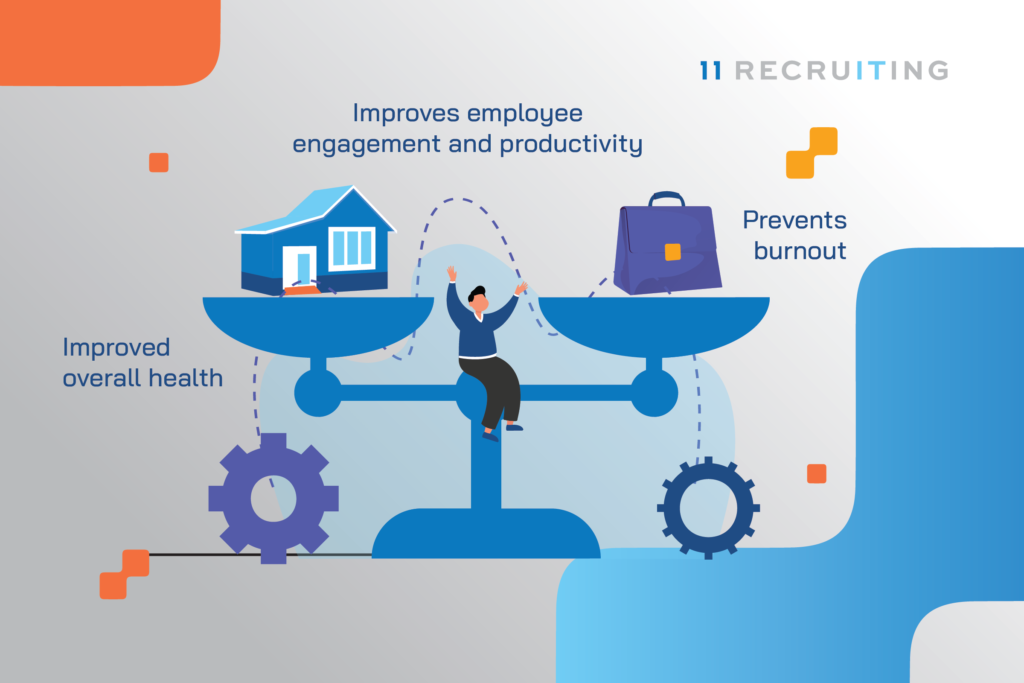
The shift towards careers with better work-life balance has grown since the Covid-19 pandemic. Companies needed to find solutions to ensure productivity while protecting workers from becoming ill. However to this day, flexible work schedules seem to continue beyond the pandemic.
What’s the future of work-life balance? Will more companies join the trend? What are the benefits of work-life balance jobs? We will unravel all these questions in this guide.
Work-Life Balance Now and Then
Before the pandemic, companies worldwide sought to have offices with open space designs, ergonomic desks , and other office necessities. The premise of an ideal worker was based on reporting to the office and sitting behind a desk daily. An office setup was thought to enhance productivity and positive work culture.
Fast-forward to a post-pandemic era, companies continue to witness employees performing well, albeit by working remotely. Employees report being happier and more productive with a change of setting. Technology such as video-conferencing and messaging apps like Asana and Slack have made it possible for employees to work remotely.
Importance of Work-Life Balance

Here are some of the benefits of work-life balance for both the business and employees.
Prevents burnout: With increased mental health issues, burnout is one of the commonly reported problems among workers. Burnout occurs when an employee doesn’t get enough rest. Constant fatigue affects the immune system, forcing the employee to take frequent sick leaves. This also affects productivity.
Giving employees enough time to rest and run personal errands will make them happy and motivated to perform.
Improves employee engagement and productivity: After resting, employees are more likely to clock into work with high energy levels. Engagement will be higher, thus increasing productivity.
Improved overall health: Balancing work and personal life improves an employee’s health. Workers who log longer hours often call in sick to rest their overworked bodies. When employees take sick leaves, it’s a loss for the business as it affects labor availability and cost of health insurance.
Frequently Asked Questions
What is the future of work concept?
The future of work refers to how businesses, employees, and workplaces will evolve. Companies need to ensure their organizations have what it takes to handle any disruptions (like the Covid pandemic) in the future.
Should you keep your work and personal life separate?
Yes, you need to separate your work from your personal affairs. This means holding all office work when it’s family time and vice versa. As a business owner, you need to put strategies that will help your workers find balance. Such strategies include flexible work schedules, more paid time offs, and vacations.
What Work-life Balance Looks Like in the Future
Companies that promote work-life balance strive to maximize employee productivity while catering to their wellbeing and personal needs. Different companies have implemented different strategies to maintain work-life balance for workers. But, what does the future look like?
More Flexibility for Workers: Most companies already implement 4-day work weeks. Others don’t have strict rules on when employees work as long as they get work done. With the onset of the Covid-19 pandemic, business owners have realized that it’s not the number of hours worked that determines productivity, rather it’s the efficiency with which they work.
In the future, expect more companies to have flexible work schedules, remote jobs, and hybrid work setups.
Time offs: In the past, many companies ignored the importance of taking time off to rest or to handle personal matters. Now, businesses are encouraging their employees to take more time off to rejuvenate.
Some employees shy away from taking time off or vacations as they don’t get paid during breaks. For this reason, organizations have introduced paid vacations and paid time offs. Who wouldn’t want to go for a paid vacation? Expect this trend to continue.
Support for parents: If organizations are honest enough, they’d admit to losing many great employees because they didn’t support employees with children. Admittingly, not all companies can afford to have daycares for workers with children. However, businesses these days are offering remote work options to parents with young children. Such efforts will help parents take care of young ones while still working.
You may expect to see more companies offering parental leaves to both moms and dads in the future.
Open communication: Most business owners only involve the managerial team when making important decisions. However, some companies are breaking the norm by involving employees in crucial decision-making. Open communication with employees will help businesses implement favorable solutions for employees. Happy employees are more productive.
Moving forward, expect employees to be more involved in making critical decisions regarding what they want for work-life balance.
In a Nutshell
Companies are breaking from the regular eight hours a day for five days a week. More jobs might lean towards having a better work-life balance for their employees in the future.
Did you enjoy reading this article? Here are other related articles on our blog.
Pros and Cons of a Four-day Workweek
Pros and Cons of a Hybrid Work Schedule
Getting The Best Work-Life Balance Jobs
Do you have any more questions on the future of jobs with work life balance? Head on to our client service page at our eleven recruiting website.

